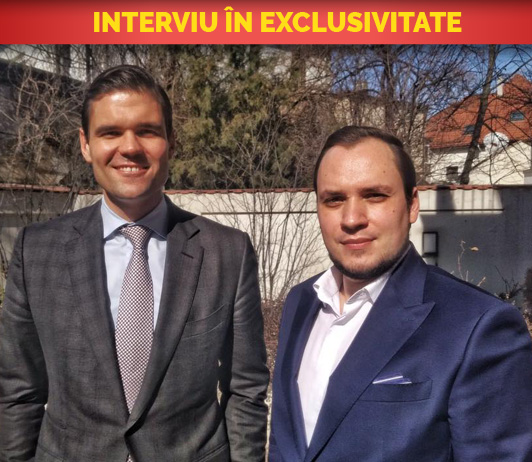Traducere și adaptare în limba română de Olga Balaur:
Alex Tapscott este un scriitor, speaker, investitor și consultant recunoscut la nivel global, a cărui activitate este centrată pe impactul noilor tehnologii, precum blockchain și criptovalute, în afaceri, societate și guvernare. Este co-autor (împreună cu Don Tapscott) al bestseller-ului de non-ficțiune: Revoluția Blockchain: Cum tehnologia din spatele bitcoin schimbă afacerile monetare și lumea, care a fost tradusă în mai mult de 10 limbi. Lucrările lui Alex au fost prezentate în TIME, Fortune, Forbes, The Harvard Business Review, the Toronto Star, the Globe și Mail și în numeroase alte publicații. Interviul său TedX din San Francisco: „Blockchain mănâncă Wall Street” a fost vizionat de peste 400.000 ori. Este investitor și consultant activ în mai multe start-up-uri si protocoale de blockchain cu creștere semnificativa.
În 2017 a înființat, împreună cu Don Tapscott, Institutul de Cercetare Blockchain, un “think tank” de milioane de dolari care investighează strategiile, oportunitățile si cazurile de utilizare ale blockchain-ului. Alex face în prezent parte din Comitetul de Consultanță pentru Alegeri Canada, agenția independentă și imparțială pentru desfășurarea alegerilor federale și referendumurilor. În noiembrie 2017, Alex și Don Tapscott au primit recunoașterea Thinkers50 prin acordarea Premiului pentru Digital Thinking Award, parte din categoria Premii pentru Realizări Deosebite.
Alex este absolvent al Colegiului Amherst si licențiat CFA Charterholder. Locuiește în Toronto, Canada.
Cum schimbă tehnologia blockchain piața avocaturii de afaceri?
Nu există niciun domeniu sau industrie care să fie imune la perturbarea cauzată de aceasta tehnologie. Blockchain va afecta, în primul rând, orice sector care există în principal pentru a conferi încredere între părți. Avocații, de multe ori, joacă rolul de intermediar terță-parte, deci această tehnologie are capacitatea de a schimba fundamental rolul avocaților corporatiști. Contractele vor face loc la “smart contracts”, acorduri auto-executabile scrise în cod sau blockchains. Avocații viitorului vor trebui să înțeleagă foarte bine această tehnologie (și altele).
Ce impact va avea blockchain-ul asupra drepturilor de proprietate intelectuală?
Impactul blockchain este deja vizibil asupra managementului riscurilor. În Revoluția Blockchain folosim exemplul dat de Imogen Heap, o muziciană care și-a lansat albumul pe un blockchain, care a transmis muzica către fanii săi în sistem “peer to peer” ca un bun digital, în care licența și drepturile erau încorporate în fișier și se executau automat.
Unii dintre principalii intermediari din industria muzicală sunt casele de discuri ca Universal si acestea există în mare pentru a impune drepturile. Aceștia iau o cotă semnificativă din munca artistului adaugând în schimb prea puțină sau nicio valoare artistului sau ascultătorului.
Prin lansarea albumului său, Mycelia, pe un blockchain, Imogen Heap a creat de fapt un sistem în care drepturile ei erau impuse chiar de platforma pe care era vândută proprietatea sa intelectuala. Este instantaneu, automat și verificabil și are potențialul de a simplifica relația dintre artist și consumator.
Aceasta relație sigură și instantanee este aplicabilă la orice tip de proprietate intelectuală. Creatorii de drepturi pot trece de la a fi plătiți ultimii, dacă sunt plătiți, la a fi plătiți corect și a fi plătiți primii.
Credeți ca în viitor va exista un drept de blockchain și avocații specializații în acest domeniu?
Există deja. Lucrăm cu ei ca cercetători la Institutul de Cercetare Blockchain în fiecare zi. Blockchain, ca tehnologie, trebuie sa fie înțeleasă de avocați deoarece va avea avea impact asupra oricărei industrii din economie, de la media (drepturi intelectuale) la producție (canale de distribuție), la servicii financiare (fiecare aspect al industriei va fi transformat). În plus, deoarece vorbim despre o tehnologie care afectează industriile bazate pe valoare, navigarea prin regulamente complexe este critică. Acum există o decalare de reglementare în anumite secțiuni ale industriei tehnologice – unde tehnologia a avansat, dar regulile încă o prind din urmă. Aceasta defazare creează nesiguranță care poate încetini inovația. Avocații care sunt receptivi la aceste provocări și pot găsi soluții vor găsi succes.
Multe companii încearcă deja să-și creeze o nișă în acest domeniu specific. Este important de notat ca blockchain-ul este o platformă pe care contractele vor fi create și executate. Este fundamental și va avea impact asupra fiecărui aspect al profesiei juridice.
Cum vedeți implicarea avocaților în tranzacțiile financiare internaționale folosind criptovalutele? Cum ajută tehnologia blockchain în aceasta privință?
Plățile internaționale sunt probabil, cel mai bun studiu de caz, pentru blockchain. Sistemul de compensare și decontare globală este demodat, consumă timp și este scump. În era digitală, n-ar trebuie să dureze mai mult timp să trimiți bani în străinătate decât îți ia să trimiți un e-mail. Din păcate, sistemul actual are atâtea straturi de intermediari încât uneori este mai ieftin să trimiți un palet cu numerar decât să faci o plată electronică transfrontalieră! Și mai mult, fiecare intermediar nou creează o nouă oportunitate ca eroarea umană să afecteze tranzacția.
Sistemele de plată bazate pe blockchain ocolesc acesta structură complexă de intermediari și îți permit să ai încredere într-o platformă unde încrederea este inerentă.
Acum criptovalutele sunt într-un stadiu atât de incipient încât poți avea dificultăți în a găsi o taxonomie și o definiție legală coerentă de la țară la țară. De fapt această nevoie de o taxonomie mai coerentă de reglementare a fost un punct de interes pentru mine în ultima vreme. În această privință, există încă un rol pentru avocați de a asigura conformitatea pe măsură ce în afaceri se folosesc criptovalute pentru a tranzacționa în cadrul diferitelor jurisdicții.
Rolul notarilor este bine definit și semnătura lor apare pe diverse contracte care necesită autentificare. Cum schimbă tehnologia blockchain dinamica în domeniul notarial?
Notarii sunt primul exemplu de persoane care există aproape exclusiv pentru a-și împrumuta propria credibilitate și a oferi încredere între părți. Blockchain-ul furnizează o platformă unde încrederea este inerentă sistemului – la asta ne referim când spunem “trust protocol”. Pe de-o parte s-ar putea argumenta că semnătura unui notar poate fi văzută ca o acțiune mai puțin eficientă de consolidare a încrederii decât o platformă pe care sunt verificate în timp real identitățile, acțiunile și acordurile dintre diferite părți. Pe de altă parte, blockchain-ul nu elimină în întregime nevoia de încredere. În multe sisteme de distribuție ai nevoie de autentificatori sau “oracles” care să ateste faptele. Aceasta ar putea fi o nouă frontieră pentru notari.
În contextul celei de-a Patra Revoluții Industriale, cum vedeți viitorul pentru profesia de avocat?
Pentru a supraviețui și a prospera în a patra revoluție industrială, avocații trebuie sa gândească strategic cu privire la modul în care va schimba tehnologia afacerile, industria, banii și legea. Se poate spune că blockchain-ul este cea mai importantă tehnologie a celei de-a Patra Ere Industriale, dar altele, precum inteligența artificială, biometrica, robotica și altele vor fi aproape la fel de perturbatoare și vor ridica multe întrebări legale noi și neexplorate până acum – ce impact vor avea “smart contracts” în dreptul corporatist? Cum vor schimba criptovalutele legile de securitate? Cum va modifica apariția acestor active digitale reglementările legale? Acestea sunt doar câteva din multele întrebări la care noua generație de minți legale deștepte va trebui sa răspundă. Avocații ar trebui sa îmbrățișeze aceasta captivantă frontieră nouă. Leadershipul este o oportunitate proprie.
Alex Tapscott is a globally-recognized writer, speaker, investor and advisor focused on the impact of emerging technologies, such as blockchain and cryptocurrencies, on business, society and government. He is the co-author (with Don Tapscott) of the critically acclaimed non-fiction best-seller, Blockchain Revolution: How the Technology Behind Bitcoin is Changing Money Business and the World, which has been translated into more than 10 languages. Alex’s work has been featured in TIME, Fortune, Forbes, the Harvard Business Review, the Toronto Star, the Globe and Mail and dozens of other publications. His TedX San Francisco talk: Blockchain is Eating Wall Street has been viewed over 400,000 times. He is an active advisor and investor in a number of high-growth startups and blockchain protocols.
In 2017, Alex co-founded (with Don Tapscott) the Blockchain Research Institute, a multi-million-dollar think-tank that is investigating blockchain strategies, opportunities and use-cases. Alex currently sits on Advisory Board to Elections Canada, the independent, non-partisan agency responsible for conducting federal elections and referendums. In November of 2017, Alex and Don Tapscott were recognized with the Digital Thinking Award from Thinkers50, as part of their Distinguished Achievement Awards.
Alex is a graduate of Amherst College (cum laude) and is a CFA Charterholder. He lives in Toronto, Canada.
How does the blockchain technology change the business law market?
There isn’t a single industry or sector that’s immune to the disruption caused by this technology. Blockchain will primarily impact any sector which exists primarily to build trust between parties. Lawyers often play the role of third-party intermediary, so this technology certainly has the capacity to fundamentally change the role of corporate lawyers. Contracts will give way to smart contracts, self-executing agreements written in code on blockchains. The lawyers of the future will need to have a firm grasp of this technology (and others).
What impact will the blockchain have on intellectual property rights?
We’re already seeing blockchain’s impact on rights management. In Blockchain Revolution we use the example set by Imogen Heap, a musician who released her album on a blockchain, who released music to her fans peer to peer as a digital asset, where the licensing and rights were embedded in the file itself and executed automatically.
One of the primary intermediaries in the music industry are labels like Universal, and they exist largely to enforce rights. They take a significant cut of an artist’s work while adding little to no value to either the artist or the listener.
By releasing her album Mycelia on a blockchain, Imogen Heap essentially created a system where her rights were enforced by the very platform upon which her intellectual property was sold. It’s instantaneous, automated and verifiable, and it has the potential to streamline the relationship between artist and consumer.
That secure, instantaneous relationship can be applied to any kind of intellectual property. Rights creators can go from being paid last, if at all, to being paid fairly and being paid first.
Do you think that in the future there will be blockchain law and specialized lawyers in this area?
There already are. We work with them as researchers at the Blockchain Research Institute every day. Blockchain as a technology needs to be understood by lawyers because it will impact every industry in the economy, from media (intellectual rights) to manufacturing (supply chains), to financial services (every aspect of the industry will be transformed). Furthermore, because we are talking about a technology that affects value-based industries, navigating complex regulations is critical. Right now there is a regulatory lag in certain parts of the technology industry- where technology has raced ahead but where regulations are still catching up. This lag creates uncertainty which can slow down innovation. The lawyers who are attuned to these challenges and can find solutions will find success.
A lot of firms are already attempting to carve out a niche in this particular field. It’s important to note that blockchain is a platform upon which contracts will be created and executed. It’s foundational, and it will impact every aspect of the legal profession.
How do you see lawyer’s involvement in international financial transactions using cryptocurrencies? How does blockchain technology help in this regard?
International payments are perhaps the most immediately evident, use-case for blockchain. The system of global clearing and settlement is byzantine, time-consuming and expensive. In the digital era, it should take no more time to send money overseas than it takes to send an email. Unfortunately, the current system is so layered with intermediaries that sometimes it’s cheaper to send a pallet of cash than a cross-border payment electronically! What’s more, each new intermediary creates another opportunity for human error to impact the transaction.
Blockchain-based payment systems bypass that complex network of intermediaries and allows you to transact on a platform where trust is inherent.
Now, cryptocurrencies are still in such a nascent state that you may struggle to find a consistent taxonomy and legal definition from country to country. In fact that need for a more consistent regulatory taxonomy has been a focus of mine more recently. In that respect, there is still a role for lawyers to assure compliance as businesses use cryptocurrency to transact within different jurisdictions.
The role of notaries is well defined, and their signatures appear on various contracts that need authentication. How does blockchain technology change this dynamics in the notarial field?
Notaries are a prime example of individuals who exist almost exclusively to lend their own credibility and provide trust between parties. Blockchain provides a platform where trust is native to the system – that’s why we refer to it as the “trust protocol.” On the one hand, you could argue that a notary’s signature may be seen as a less efficient and effective trust-building action than a platform upon which the identities, actions and agreements of various parties are verified in real-time. On the other hand, blockchain does not remove the need for trust entirely. In many distributed systems you need authenticators or “oracles” to attest to the facts. This could be a new frontier for notaries.
In the context of the Fourth Industrial Revolution, how do you see the future of the lawyer’s profession?
To survive and thrive in the fourth industrial revolution, lawyers must think strategically about how technology is going to change business, industry, money and the law. Blockchain is arguably the most important technology of the Fourth Industrial age, but others, such as artificial intelligence, biometrics, robotics and others will be nearly as disruptive and will raise many new and previously unexplored legal questions – how will smart contracts impact corporate law? How will cryptoassets change securities laws? How will the rise of these new digital assets challenge or disrupt regulations? These are but a few of the many questions that the next generation of smart legal minds will need to answer. Lawyers should embrace this exciting new frontier. Leadership is your personal opportunity.














